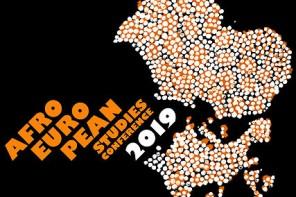Black In/Visibilities contested
The 7th Biennial Conference Network Afroeuropeans: “Black In/Visibilities Contested” will be held in Lisbon (ISCTE - IUL), and is an important platform for the production of knowledge in the pertinent field of transdisciplinary research on racism, black cultures and identities in Europe. It also offers the opportunity to strengthen and widen networks between scholars, activists and artists that question structural racism and are critically engaged with the production of postcolonial knowledge on european blackness and the african diaspora. This dialogue and networking is promoted through keynotes and panels, round-tables, individual speakers and artistic and cultural activities.
This conference is the result of a long collaboration between academics, writers and artists from many European universities and research institutes and from other parts of the world that gave rise to the international network “Afroeurope@s: Cultures and Black Identities in Europe”. With the aim of deepening the knowledge of black populations in Europe and their contribution to society in all areas of life, the network organized conferences in different European universities: University of León in 2006 and 2009; University of Cádiz in 2011; University of London and Open University in 2013; University of Münster in 2015 and University of Tampere in 2017. We are honored to bring this debate for the first time to Lisbon, a city with one of the largest African diasporas, which has influenced literature, music, language and the Portuguese society in general in the last five centuries. The local organizing committee is composed of researchers, artists and activists from different universities and collectives from Portugal, Brazil and Switzerland.
The title of the conference incorporates the tensions, ambiguities and paradoxes of Blackness in Europe. At the same time as black histories, cultures and social conditions are made invisible in hegemonic accounts on Europe, there is a hypervisibility and presence of black stereotyping in European popular culture. Also, while the concept of race has largely disappeared from political, sociological and administrative discourses (in continental Europe), and while the disengagement with institutional and structural racism has been reframed in new capitalist post racial rhetorics, racial markers still have currency, and black bodies continue to be invoked as either tolerated guests at best, or threatening intruders at worst. The consequence is the practice of “embodying an identity that is declared impossible even though lived by millions”, namely as non-white Europeans, and specifically as Black Europeans. This identity has become even more conditioned by a new mainstreaming of right-wing discourses and the tightening immigrant and refugee policies that affect people of African descent.
The conference addresses not only these relations of domination, and racial modes of exclusion, but engages primarily with the continuous contestations and resistance these in/visibilities have gone by. We turn our gaze to the disregarded histories and cultures, and inquire past, new and continuous forms of Afroeuropean political, social, cultural and artistic interventions and resistance. This implies taking into account the different positionalities within European Blackness, linked for instance to diasporic origins, language, gender, social class, citizenship status, sexuality, dis/abilities, as well as the varying geo-spatial and post-colonial historical formations.

This conference and the approved panels were organized following six thematic lines:
> Black Europe at its Intersections:
Panels should reflect the various axis of difference that co-structure Black European cultures and identities. We especially welcome panels that reflect on gender and sexuality, such as black women, LGBTIQ communities, but also about black masculinities and femininities, their conditionings, networks and forms of resistance.
> Afroeuropeans in the Arts and the Mediasphere:
Panels in this thematic area should address the multiple artistic and media expressions (literature, visual arts, aesthetics, traditional and digital media, etc.) of the Black European population, understanding these practices as spaces of creating visibility for black histories, experiences, culture and antiracism.
> Activisms, Resistances and Public Policy in late Capitalist Europe:
On the one hand, this axis intends to cover the ways in which “colorblind” and “Fortress Europe” public policies affect, distort and (in)visibilize the various expressions of inequality to which black populations are subjected in times of advanced late capitalism. On the other hand, this axis is dedicated to the analysis of Afroeuropean social movements (local, regional, national and transnational), organizations and practices of contestation and resistance against these policies and processes.
> Black Cities: Public Space, Racism, Urban Cultures and Segregation:
We invite panel proposals that address black racialization in urban life and the experiences (and insertions) of people of African descent. We are interested in broadening the debate both on the problems that affect black people in the contemporary cities – segregation, racism, subalternity, stigmatization, ghetto –, as well as analyzing the Afroeuropean interventions into the public space: lifestyle, artistic expressions, urban cultures and identities.
> Decolonising Knowledge on Black Europe, African Diaspora and Africa:
We welcome panels that debate the decolonization of knowledge on Black Europe, African Diaspora, Africa and colonial empires, but also the actual processes of constructing new contra-hegemonic narratives.
> Theorizing Blackness and Racial Europe:
Panels in this thematic area address the theoretical questions that shape the whole of social relations and the social experience of Afroeuropeans, discussing the very definition(s) of Race, Racism, Blackness as well as Whiteness and how this co-produces Europe as a spatial-temporal formation.
stephen small
KEYNOTE SPEAKERS
fatima el-tayeb